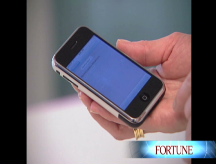For overseas travel, domestic phones are the best bet
Thanks to sky-high exchange rates, exhorbitant American mobile calling plans are suddenly priced competitively. Our gadget guy put three phones through their paces in Venice.
VENICE, ITALY (Fortune Small Business) -- The world may indeed be flat, and we all might be competing in a global village. But that doesn't mean we here in the small-biz world can make a cheap, reliable international phone call.
Small-business travelers will find a new headache this European travel season as they attempt to keep in touch with their operations back home: Greenbacks trade at about $1.50 per euro, and a $1.70 street price is not uncommon. So 50 euros spent on an in-country cell phone and calling plan, the old traveling-businessman's telecom trick, now costs you at least $75. That'll keep you in touch with the home office for maybe a few hours - if you're lucky.
That means - get ready for a painful shock - that domestic mobile carriers' exhorbitant international rates are now your best option.
American cellular carriers seem to take a sort of glee in burning international travelers: Voice rates to America from Europe can run around $1.30 per minute, text messages might cost 50 cents each, and heaven knows how much you pay to call from one overseas country to another.
But American carriers have quietly ramped up their international calling options with improved phones, better services and some wisps of discounts. Plus, international "roaming" phones offer the fabulous feature of letting you do business overseas with your own number. That's important for business travelers, because little frosts clients more than asking them to manage a zillion-digit international calling code.
To get a sense of American cell-phone carriers' newest international calling options, I took three of latest international roaming phones out with me for a week of Venetian rowing. The competitors: The Motorola (MOT, Fortune 500) z6c from Verizon (VZ, Fortune 500) ($180 with a plan, $1.29 per minute of voice usage to the U.S. from Italy, and 50 cents per text message); the Samsung ACE from Sprint Nextel (S, Fortune 500) ($199 with plan, $1.29 per minute for voice to the U.S. from Italy, and about 10 cents per text message); and the Samsung Blackjack from AT&T (T, Fortune 500) ($99 with plan; $0.99 per minute for voice to the U.S. from Italy, which requires a $5.99 per-month payment to get that discounted rate; and 50 cents per text message).
Here is what I learned.
Rule 1: Expect fabulous call quality.
I'll start with the good news: There is no beating the voice quality on these dual-mode phones. It was almost like I wasn't traveling at all. Remember, Venice is an ancient city in the middle of what amounts to a huge swamp, full of buildings with six-foot-thick stone walls and filled to the gills with international tourists doing little else than gabbing on their mobile phones.
Despite all this, the quality of my calls was stupendous. No matter where I was and what I did - conference calls, voicemail, a chat with my mother in Maine, you name it - there was no latency, no jitter. One of my editors said that talking to me from the Accademia Bridge was clearer than talking to me from the Brooklyn Bridge.
Rule 2: Provision carefully.
Now the bad news: Despite the excellent performance, keep in mind that global roaming is a sophisticated handoff between your American provider and any one of a number of international cell phone companies. A lot can go wrong. And though you can expect excellent phone-support service from all major carriers - I had my best support session in years from Sprint tech - there is often little to be done to solve your problem. Remember, you will be something like 6,000 miles from home, and local carrier support will not help you.
Before you leave home, get your local phone rep to walk you through your phone's first international boot-up. International communications settings will be buried deep inside your phone. Learn where those settings are.
Rule 3: Stay off the %^&#*@ phone.
Whatever you do, do NOT get sucked into Euro-style, nonstop chatting on the mobile. Your cell-phone bill will be higher than your airfare.
Instead, rely on every conceivable communication alternative: text messaging from the cell phone, while far from cheap, worked for me. I found that simply ignoring all but the most important inbound calls also was effective at cutting costs.
And most importantly, bring that laptop. E-mail is still the communications weapon of choice for international travelers, and nothing is more depressing than trying to work in some Internet cafe while a bunch of exchange students try to get you to vacate your rented computer so that they can write their school reports. (Big caveat: Don't even think of using Internet telephony products like eBay's (EBAY, Fortune 500) Skype on your laptop. The Web phone is just not ready for small-business prime time. Calls can be fine, or they can sound awful. Don't blow a client relationship trying to nickel-and-dime your way on Skype.)
Bottom line: While still brutally, savagely pricey, American global roaming phones are the best international communications tool for the small-business traveler. Thanks to high exchange rates, they're now competitive on price and can offer outstanding performance.
If you travel only once a year, I still would advise you to give a global roaming phone a thorough look. Verizon's Motorola unit was my pick of the three in terms of ease-of-use and quality, at least here in Italy. If you are abroad more than twice a year, the switch to a global phone is absolutely mandatory. And if you travel abroad even more often, I would seriously consider moving to a Global System for Mobile (GSM) carrier like AT&T. There is no beating the price on both hardware and usage.
It's getting to be a small world. You need the best tools if you are going to profit from it. ![]()
Running an entire business from smartphones
More Blum on Tech:
Beyond the iPhone: Nokia N95 is smart pick
Why Macs still aren't right for most businesses
Hollywood finds depth: 3-D boom
-
The Cheesecake Factory created smaller portions to survive the downturn. Play
-
A breeder of award-winning marijuana seeds is following the money and heading to the U.S. More
-
Most small businesses die within five years, but Amish businesses have a survival rate north of 90%. More
-
The 10 most popular franchise brands over the past decade -- and their failure rates. More
-
These firms are the last left in America making iconic products now in their twilight. More










